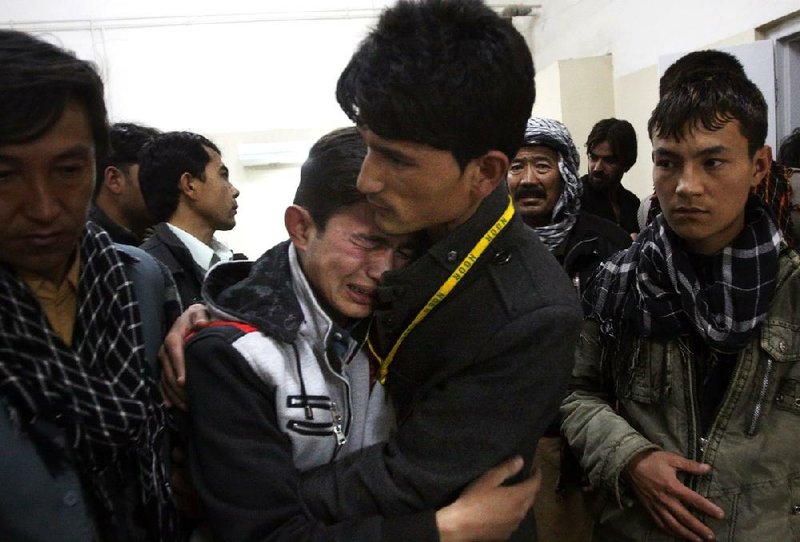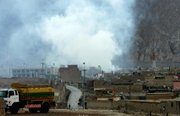QUETTA, Pakistan — A bomb hidden in a water tank ripped through a crowded vegetable market in a mostly Shiite neighborhood in a southwestern Pakistani city Saturday, killing at least 81 people and wounding nearly 200, officials said.
Police said many of those wounded in the explosion in Quetta remain in critical condition. The blast, which police said targeted the country’s minority Shiite Muslim sect, left many victims buried under rubble, but authorities did not know how many.
It was the deadliest attack since Jan. 10, when a Sunni group bombed a billiards hall and killed almost 100 Hazaras, prompting domestic and international anger that led to the toppling of the local government.
Shiites have been increasingly attacked by militant groups who view them as heretics and non-Muslims in the Sunni Muslim-dominated country. Many of the Shiites in Quetta, including those in the neighborhood attacked Saturday, are Hazaras, an ethnic group that migrated to Pakistan from Afghanistan more than a century ago.
Quetta Police Chief Zubair Mahmood told reporters the bomb was hidden in a water tank and towed into the market by a tractor. He said the blast destroyed shops in the neighborhood and caused a two-story building to collapse.
“We fear some victims may be found buried there,” he said.
Mahmood said police did not yet know who was behind the bombing, but a local television station reported that Lashkar-e-Jhangvi, a Sunni extremist group that has targeted Shiites in the past, had called to claim responsibility.
Senior police officer Wazir Khan Nasir said the bomb, set off in a residential suburb, was detonated by remote control.
Another officer, Samiullah Khan, said the bomb was detonated while dozens of women and children were buying produce for their evening meals. Local residents rushed the victims to three hospitals, often in private vehicles because there weren’t enough ambulances to transport them.
A plume of white smoke rose over the area after the bomb blast. Television footage of the scene showed the streets littered with rubble from destroyed buildings, mixed with fruits and vegetables and shattered street carts.
Near one of the hospitals where the dead and wounded were taken, a man stood weeping as people were being taken in on stretchers.
“Look at our misery! We are helpless,” he said.
Members of the minority Shiite sect took to the city’s streets in angry protest, blocking roads with burning tires and throwing stones at passing vehicles.
Many also started firing into the air in an attempt to keep people away from the area in case there was a secondary explosion. Sometimes insurgents stagger the explosions as a way to target people who rush to the scene to help and thus increase the death toll.
Police cordoned off the area. Most of the Hazaras in the area were quick to blame Lashkar-e-Jhangvi.
“This evil force is operating with the patronage of certain elements in the province,” said Qayum Changezi, the chairman of a local Hazara organization.
Prime Minister Raja Pervaiz Ashraf quickly condemned the attack, emphasizing the government’s resolve to fight “such dastardly acts” and vowing to bring the perpetrators to justice.
Saturday’s attack was the worst since a series of bombings Jan. 10 killed 86 people in Quetta, almost all Hazara Shiites. Residents were so furious that they refused to bury their dead for days, instead camping out on the streets with the bodies in coffins in protest and demanding the government address the problem.
After days of protests, Ashraf flew to the city to meet with protesters and sacked the chief minister and his Cabinet.
That protest captured the sympathies of Pakistanis across the country, and helped galvanize political opinion against a growing problem of sectarian attacks on minority Shiites in Quetta, Karachi and northwestern Pakistan.
But Saturday’s attack showed the still potent power of the militant groups behind such violence.
Quetta is the capital of Baluchistan province, where the Shiite minority has been attacked several times in recent months. Baluch nationalist groups are fighting an insurgency there to try to gain a greater share of income from the province’s gas and mineral resources. Islamic militants also are active in the province.
The largest sectarian group, Lashkar-e-Jhangvi, is widely believed to be based in the town of Mastung, south of Quetta. Few of its members have been captured or arrested.
Lashkar-e-Jhangvi took its name after a firebrand Sunni cleric who gave virulently anti-Shiite sermons.
Pakistan’s intelligence agencies helped nurture Sunni militant groups like Lashkar-e-Jhangvi in the 1980s and 1990s to counter a perceived threat from neighboring Iran, which is mostly Shiite. Pakistan banned Lashkar-e-Jhangvi in 2001, but the group continues to operate fairly freely.
Last year was particularly deadly for Shiites in Pakistan. According to Human Rights Watch, more than 400 were killed in targeted attacks across the country. The human-rights group said more than 125 were killed in Baluchistan province; most of them belonged to the Hazara community.
Rights groups have accused the government of not doing enough to protect Shiites in the country.
Information for this article was contributed by Abdul Sattar and Zarar Khan of The Associated Press and by Declan Walsh of The New York Times.
Front Section, Pages 1 on 02/17/2013


